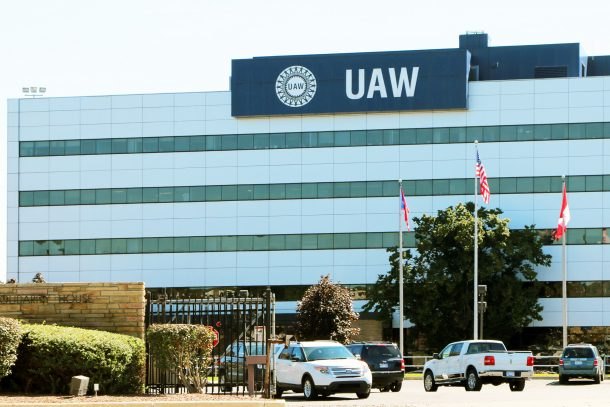UAW Reports Death of Two FCA Factory Employees With Coronavirus

The UAW has announced the death of two Fiat Chrysler factory workers who contracted the novel coronavirus, extending sympathies while urging members to exercise safe practices during the ongoing health crisis. With COVID-19 infections ramping up across Europe and the United States, this was to be expected. The deaths are simply the first known to impact autoworker union members directly.
FCA declined to offer the names of the men, citing a respect for privacy. For our purposes, we’re only interested in their places of business, noticing the facilities where the two individuals worked — FCA’s truck plant in Sterling Heights, MI and transmission facility in Kokomo, IN — previously reported cases of employees contracting the virus.
Fiat Chrysler Automobiles closed its North American assembly plants last week for at least the remainder of this month. At the time, it had previously idled its facility in Sterling Heights after an employee reportedly contracted the new coronavirus. There were also reports of contagion at the Kokomo site, with at least one worker testing positive on March 12th.
According to Automotive News, the UAW recently shared news of a third death — this time from the Warren Truck Assembly Plant near Detroit, though the union said it wasn’t clear that the employee had actually contracted the virus, just that they were being treated for similar symptoms before passing away.
In a letter to members, UAW President Rory Gamble briefly noted the loss of life before shifting to the game plan put in place to avoid future tragedies. This deals largely with union victories in getting other manufacturers and suppliers to finally shut down plants or extend closures already in effect:
We had some other positive news today. Working with the Ford Motor Company, we got the announcement that they will not be reopening plants on March 30, as was originally planned, due to numerous stay-at-home orders from government officials. We commend Ford for this action. FCA has told us that they intend to comply with Michigan Governor Gretchen Whitmer’s order and have no plans to reopen on March 30. We are waiting to hear from GM and are demanding that they put our members’ safety first and adhere to government and health officials’ recommendations to stay-at-home. We will keep you updated.
In another positive development, the UAW and Ford Motor Company will be collaborating to find ways to help improve and protect lives across the country during this crisis. And, news from the UAW GM department announced a collaboration with the company to produce much needed ventilators to help save lives.
He closed by commending employees from all sectors who had to stay on the front lines to keep essential services operational in the United States, adding that the UAW would do everything in its power to keep everyone safe and slow the spread of the virus. It’s unlikely these will be the only UAW deaths reported.
The swift outbreaks that took place in Italy and Spain could foreshadow what the United States may endure if proper precautions aren’t taken. Though it could be argued that neither European country understood the seriousness of the situation before it was too late, Italy, which has also closed down all non-essential business, has reported the most coronavirus-related deaths of any nation in the world.
By contrast, China appears to be fairing rather well and now has fewer reported deaths than either of the suffering nations in Europe — despite it having more total cases and serving as the point of origin for COVID-19. However, that’s dependent on your preferred news sources. Many outlets seem to take China’s figures at face value, occasionally praising its aggressive response — albeit less so lately. Others claim the real numbers should be much higher and point to a string of governmental coverups stretching back before January.
Ideally, reliable data would have helped other nations better prepare for seemingly inevitable outbreaks, but that’s difficult to quantify or guarantee without the benefit of hindsight. The current reality is that countless industries must now make last minute plans as governments around the world scramble to come up with a solution. And it’s probably what we should be focused upon. For now, the automotive sector is operating (or more accurately not operating) in a fog of uncertainty. Workers want to work, but not get sick, and manufacturers want them building cars without spreading disease.
Sadly, those options appear to be mutually exclusive for the time being.
[Image: James R. Martin/Shutterstock]

A staunch consumer advocate tracking industry trends and regulation. Before joining TTAC, Matt spent a decade working for marketing and research firms based in NYC. Clients included several of the world’s largest automakers, global tire brands, and aftermarket part suppliers. Dissatisfied with the corporate world and resentful of having to wear suits everyday, he pivoted to writing about cars. Since then, that man has become an ardent supporter of the right-to-repair movement, been interviewed on the auto industry by national radio broadcasts, driven more rental cars than anyone ever should, participated in amateur rallying events, and received the requisite minimum training as sanctioned by the SCCA. Handy with a wrench, Matt grew up surrounded by Detroit auto workers and managed to get a pizza delivery job before he was legally eligible. He later found himself driving box trucks through Manhattan, guaranteeing future sympathy for actual truckers. He continues to conduct research pertaining to the automotive sector as an independent contractor and has since moved back to his native Michigan, closer to where the cars are born. A contrarian, Matt claims to prefer understeer — stating that front and all-wheel drive vehicles cater best to his driving style.
More by Matt Posky
Latest Car Reviews
Read moreLatest Product Reviews
Read moreRecent Comments
- Formula m For the gas versions I like the Honda CRV. Haven’t driven the hybrids yet.
- SCE to AUX All that lift makes for an easy rollover of your $70k truck.
- SCE to AUX My son cross-shopped the RAV4 and Model Y, then bought the Y. To their surprise, they hated the RAV4.
- SCE to AUX I'm already driving the cheap EV (19 Ioniq EV).$30k MSRP in late 2018, $23k after subsidy at lease (no tax hassle)$549/year insurance$40 in electricity to drive 1000 miles/month66k miles, no range lossAffordable 16" tiresVirtually no maintenance expensesHyundai (for example) has dramatically cut prices on their EVs, so you can get a 361-mile Ioniq 6 in the high 30s right now.But ask me if I'd go to the Subaru brand if one was affordable, and the answer is no.
- David Murilee Martin, These Toyota Vans were absolute garbage. As the labor even basic service cost 400% as much as servicing a VW Vanagon or American minivan. A skilled Toyota tech would take about 2.5 hours just to change the air cleaner. Also they also broke often, as they overheated and warped the engine and boiled the automatic transmission...


































Comments
Join the conversation
A major issue with C5's and TheLaine's beliefs are that the economic aftermath of a downturn will be neither as pronounced or as prolonged as they keep stating. It will instead be a blip. The infrastructure will remain intact. Pent up demand will unleash consumer spending. Some must be too young to remember that traditionally Western Societies largely 'shut down' for 4 days over Easter, and from the period of December 24th to January 2nd. With zero negative economic impact. In Ontario all stores were required to legally close on Sundays until the early 1990's. Again with no negative economic impact. The majority of manufacturers would regularly have total plant shutdowns, generally in early August, again with no negative impact. To this day many societies practice a 3 week hiatus/general vacation in August, with little negative economic impact. Whereas prolonging the infection period and overwhelming the healthcare facilities would have a serious economic impact. As they say in risk management 'it is better to mistake a rock as a bear, than to mistake a bear as a rock'.
I thought this site was about cars not. Now the comments seem (mostly) to be political knee jerk-ian foaming at the mouth.